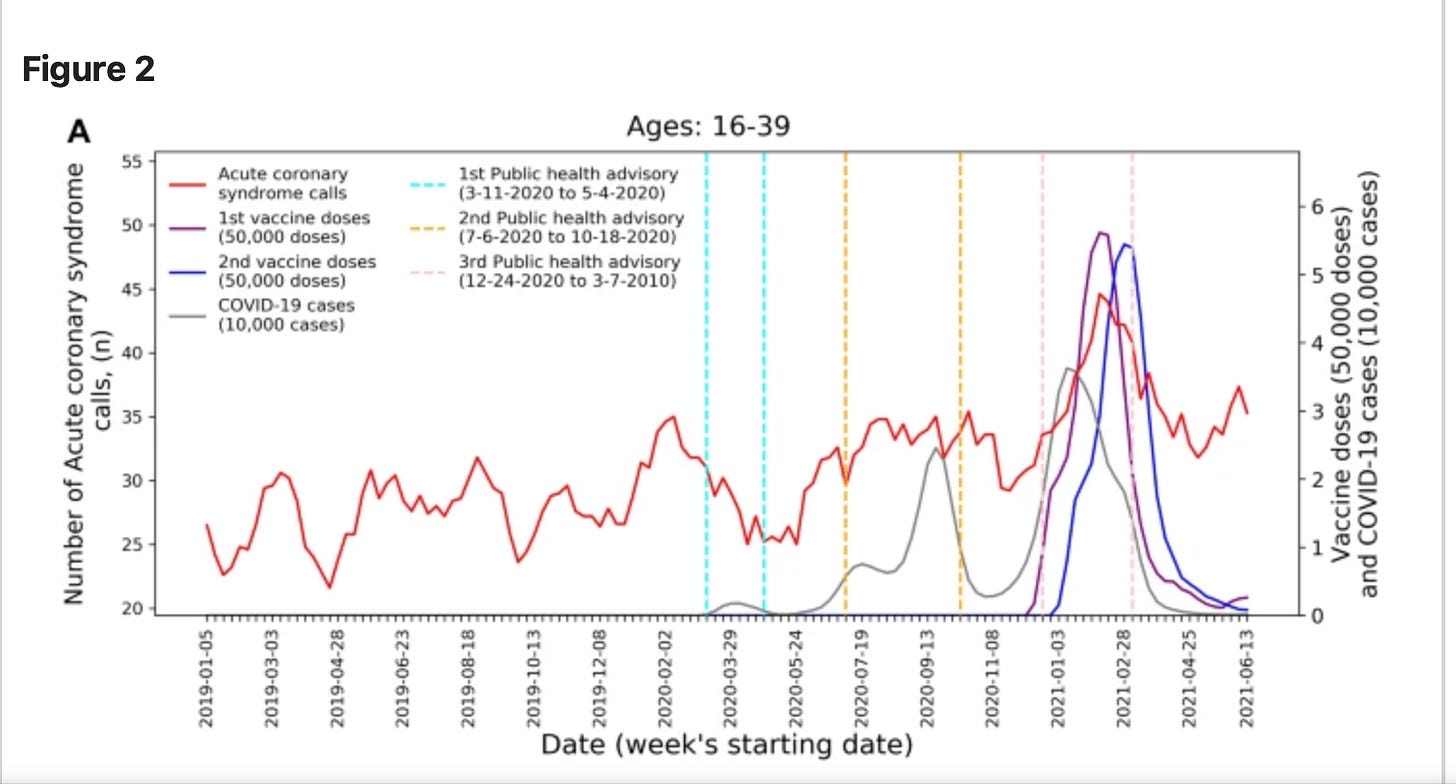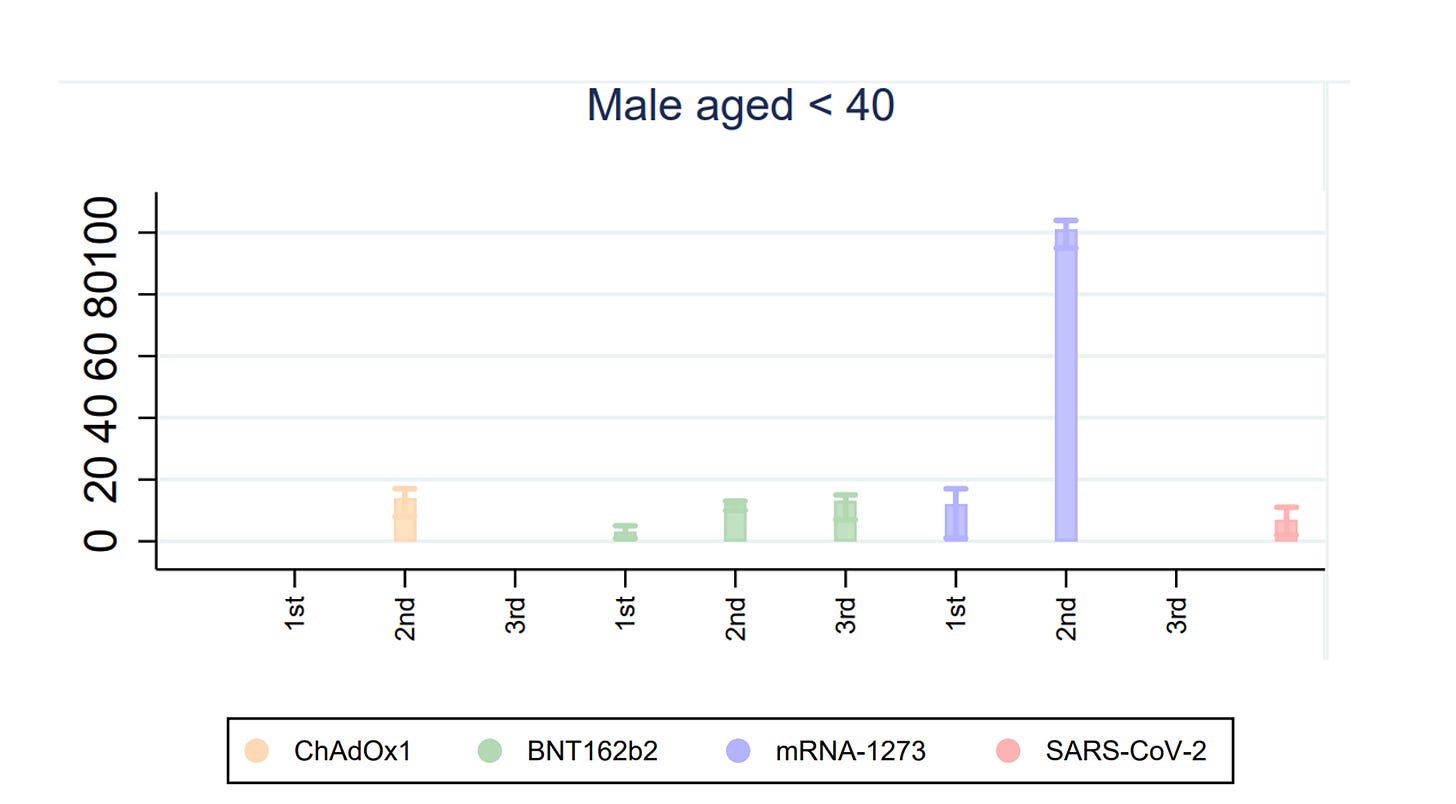Increased Emergency Cardiovascular Events Among Under-40 (Vaccinated) Population In Israel
During vaccine rollout and third Covid-19 wave.
According to a study recently published in Nature, researchers found an increase in emergency cardiovascular events among the under-40 population in Israel during the Covid-19 vaccine rollout and the third Covid-19 wave.
Cardiovascular adverse outcomes such as blood clotting (e.g., coronary artery thrombosis), acute coronary syndrome, cardiac arrest and myocarditis have been identified as consequences of coronavirus disease 2019 (COVID-19) infection1,2,3,4,5. Similarly, data from regulatory surveillance and self-reporting systems, including the Vaccine Adverse events Reporting System (VAERS) in the United States (US)6, the Yellow Card System in the United Kingdom7 and the EudraVigilance system in Europe8, associate similar cardiovascular side-effects9,10,11,12,13 with a number of COVID-19 vaccines currently in use.
More recently, several studies established probable causal relationship between the messenger RNA (mRNA) vaccines of BNT162b2 and mRNA-127311,14,15,16 as well as adenovirus (ChAdOx1) vaccines17 with myocarditis, primarily in children, young and middle-age adults. The study by the Ministry of Health in Israel, a country with one of the highest vaccination rates in the world, assesses the risk of myocarditis after receiving the 2nd vaccine dose to be between 1 in 3000 to 1 in 6000 in men of age 16–24 and 1 in 120,000 in men under 3011,12,13. A follow up study by the US Center of Disease Control (CDC) based on the VAERS and V-Safe self-reporting systems18 further confirms these findings19. The CDC has recently posted a warning regarding a vaccine-related risk of myocarditis, but still maintained their recommendation to vaccinate young individuals and children over 127. Similar concerns are reflected in the recent Food and Drug Administration approval to the Pfizer vaccine that requires several follow studies on the short and long terms effects of myocarditis in young individuals20.
It is worth noting that this is not the first published research paper to evaluate cardiovascular events following the rollout of the covid-19 vaccines, An earlier study was published in Nature in the Fall of 2021 showing increased myocarditis and pericarditis. “The increased risk of myocarditis after vaccination was higher in persons aged under 40 years” noted researchers in this earlier study. Dr. Vanay Prasad has reviewed this study more closely and he believes that the association between the vaccines and increased myocarditis and pericarditis is higher and more significant than the study authors initially indicated.
This was the key figure in a Nature Medicine paper published on Dec 14, 2021. It showed clearly that myocarditis after vaccination (in this case, Moderna dose 2) was higher! than myocarditis after sars-cov-2 infection for people <40.
But the story does not end there….
There were a few remaining issues. While the denominator for vaccines is known with precision, the true number of infections is unknown. Many people don’t seek testing or medical care. So the red bar above will be shorter if you used a sero-prevalence (aka the correct) denominator. The authors needed to fix this.
The other problem is that this analysis lumps together men & women, while men have the greatest risk. Well, the authors are back with a new pre-print to fix this point, and here is what they find.
It is now clear for men <40, dose 2 and dose 3 of Pfizer have more myocarditis than sars-cov-2 infection, and this is true for dose 1 and dose 2 of Moderna.
Pfizer boosters (Dose 3) have more myocarditis for men <40 than infection.
Myocarditis post infection is more common as you get older, in contrast with myocarditis post vaccination, which is more common as you are younger (reverse gradients)
But the truth is STILL WORSE than these data.
If the authors fixed the denominator for viral infection (i.e. used sero-prevalance), it would look even worse
If the authors separate men 16-24 from 12-15 and 25-40, it would likely look worst in 16-24 age group.
But regardless, these findings already clearly dispel the true misinformation online: Yes, sorry to break it to you, vaccines can have risks of myocarditis EXCEEDING risks of myocarditis from infection. Pls stop saying otherwise.
Dr. Vanay Prasad on Substack
Below is an excerpt from the 2021 study:
As of 4 November 2021, there have been 1,783 reports to the United States Vaccine Adverse Event Reporting System (VAERS) of cases of heart inflammation, namely myocarditis or pericarditis, among people aged 12–29 years who received COVID-19 vaccines, in particular following mRNA vaccination, that is, BNT162b2 and mRNA-1273 vaccines2.
As of 9 July 2021, the European Medicines Agency (EMA) has reported 145 cases of myocarditis and 138 cases of pericarditis out of 177 million doses of the BNT162b2 vaccine, and 9 cases of myocarditis and 19 cases of pericarditis out of 20 million doses of the mRNA-1273 vaccine3. In Israel, 275 cases of myocarditis were reported between December 2020 and May 2021 among more than 5 million people vaccinated with the BNT162b2 vaccine4.
“Risks of myocarditis, pericarditis, and cardiac arrhythmias associated with COVID-19 vaccination or SARS-CoV-2 infection” as published in Nature.
Editor’s note: The editors of Nature have added an editorial note that they have received a number of criticisms of the (more recent) referenced cardiovascular study based on Israeli data and state that they will issue an editorial response once “all parties have been given an opportunity to respond in full.”





